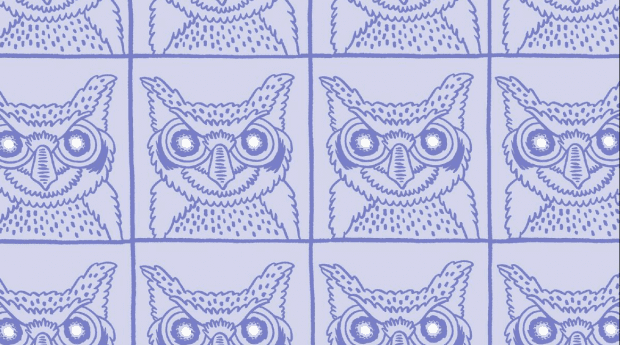“I can’t sleep.”
RM Vaughan’s statement looks simple enough; we’ve all said it at one time or another. Then the multi-tasking artist — novelist, critic, poet, essayist, playwright, editor, video artist and journalist — adds more: “If those three words in that sequence constituted some kind of prayer, I would certainly be an earthly saint by now, if not a blessed white-winged angel, because I say them every night, night after night, and all night long. I’ve done so since I was 10.”
With that declaration, Vaughan begins an intriguing but downcast tour through his decades of insomnia and into the globe’s burgeoning, corporate capitalism-fuelled culture of insomnia, titled Bright Eyed.
Across chapters like “The War on Sleep” and “Walking After Midnight,” Vaughan offers glimpses into his vexed epochs of sleeplessness, which include a history of dissatisfied sleep-mates. And he conjures an emerging dystopian reality (aka “insomnia culture,” a “cultural condition, like alienation or bullying/being bullied,” which he has watched “grow and fortify itself over the decades”). From Bright Eyed, in fact, it’s possible to view his condition as being the vanguard; someday soon, all humans could be there.
His book’s primary question—“If the world around us is being run, ordered, financed, and even entertained by people who are not sleeping well or not sleeping enough (or, in my case, barely at all), what kind of culture will we be sharing in the future?”— contains worrisome indicators of an answer no one wants to hear.
With Bright Eyed, Vaughan also wants to give a (fatigued) human face to a subject that’s received significant scholarly attention in the past decade. “Both Summers-Bremner’s Insomnia: A Cultural History and [Jonathan] Crary’s 24/7 are fantastic books,” he says. “My goal is to add to the dialogue by describing a personal experience, my own, and, more important, to mark the obvious fact that since those books were published the problem of naturalizing insomnia in pursuit of ‘total productivity’ has worsened, alarmingly worsened.”
His research has given him plenty of reasons to be alarmed now and deeply concerned about well-lit upcoming decades.
His book covers the quackery and desperate remedies, too. Most of which haven’t helped him in the slightest., “[I’ve tried] yoga, which I know most people don’t think of as extreme, but I detested the religiosity of the practice . . . a concoction from a traditional Chinese medicine shop that I’m not certain did not contain antler hairs, and Icelandic runic magic which, if nothing else, was calming, because there is a lot of drawing involved.”
Although he’s been burdened with insomnia for about four decades, he finds that now it’s easier to share the difficulties he faces with others. “Well, today, I don’t feel as alone as I used to, at least when I talk about insomnia with my friends, or new friends I meet at parties who find out I am writing about the topic and freely offer up their own experiences,” he says.
“But, as I point out in the book, one of the weird situations chronic insomnia creates is that you feel alone, late at night, like you’re the only person on the planet still awake, and then you go online and you find out that half the people you know are still awake. But the fatigue that insomnia causes, psychological and physical, keeps you from actually going out and doing anything about your alone-ness.”
Envisioning the insomniac future as a “dull hell,” Vaughan concludes his book with the slightest of glimmers for his own situation. “Maybe the demons will float away, find viler bodies to overrun,” he writes. His underlying tone has its own message “But probably not.”
Buy Bright Eyed wherever you like to buy books.
rmvaughan.ca

 Why you can trust Xtra
Why you can trust Xtra


